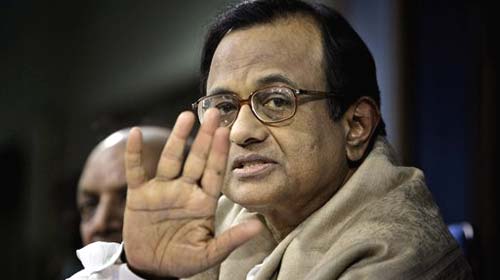
Finance Minister P Chidambaram, who made a statement in Rajya Sabha on behalf of indisposed Home Minister Sushilkumar Shinde, defended the decision of the state government not to allow BJP leader Arun Jaitley to visit Kishtwar town, the scene of communal violence.
Responding to concerns expressed by members over violence in the state, he said the situation in Kishtwar was "near normal" and no untoward incident had been reported since August 9.
While noting that violence had been witnessed in some other parts of Jammu province, the minister said, "Overall situation in Jammu and Kashmir is tense but under control."
He said sufficient army contingents had been deployed in violence-hit areas and they conducted flag marches to instill confidence.
"The central government will extend all support to the state government to maintain law and order and ensure peace and harmony in the state," he said.
He sought to dismiss apprehensions that the situation could go out of hand and lead to a repeat of 1990 when the entire Kashmir Pandit community was forced to leave the Valley.
"We will not allow repetition of 1990. We will not allow forced migration. We will not allow forced resettlement," he asserted.
Stating that a judicial inquiry into the communal clashes in Kishtwar district would be conducted, Chidambaram said the state government would be asked to make it a "credible inquiry".
Giving details of the events that unfolded since Friday last in Kishtwar town, Chidambram said violence erupted after a clash between some individuals and processionists on the day of Eid.
Some of processionists raised "pro-azadi slogans", he said adding, however, that raising such slogans is not a new phenomenon as it happens "virtually every Friday".
Two people were killed in Kishtwar, while one was found dead in another area.
"So far death toll is three -- one Hindu, two from Muslim community. But all of them are Indians," he said, adding that he deeply regretted this.
On the action taken, he said Deputy Commissioner and Senior Superintendent of Police have been transfered. Also, several people have been arrested and more arrests would follow.
About problems being faced by the state, he said, "There is a challenge of infiltration. There is a challenge of terrorists. There is also challenge of undercurrent of tension between one community with another."
He said it is not correct to assume that the undercurrent of tension between one community with another is linked to terror element or external aggression.
Chidambaram said "near normalcy" has been restored and every effort would be made towards maintaining law and order.
Rejecting the Opposition's charge of "censorship", he said Jaitley was prevented from visiting Kishtwar as the district administration came to conclusion that it was "not an appropriate time" for the BJP leader to go there.
"This is not an unusual order. States have passed such orders in the past. District administration is the best judge of the situation," Chidambaram said, responding to questions by Jaitley as to why he was detained at Jammu airport which is quite far away from Kishtwar.
Observing that it was the time for restraint, he assured Jaitley and other political leaders that they would be allowed to visit once normalcy is restored.
Jaitley's party colleague Ravi Shankar Prasad questioned as to why a person of the stature of Leader of Opposition in the Rajya Sabha was detained under the Section 144, which prohibits assembly of more than four people at one place.
To this, Chidambaram said, "It is a status neutral section. It is also gender neutral, religion neutral and caste neutral." This evoked laughter in the House.





Comments
Add new comment